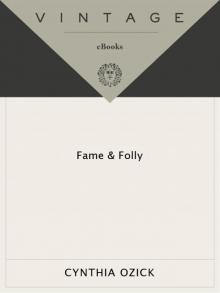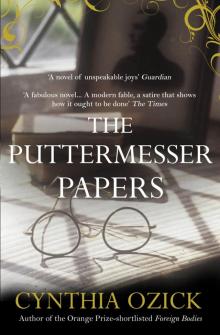- Home
- Cynthia Ozick
Foreign Bodies Page 2
Foreign Bodies Read online
Page 2
3
July 28, 1952
Dear Bea,
You missed him? You were right there in Paris, you knew exactly where he was, you knew reasonably well where he might be employed, and I depended on you. And what do I get instead? A weather report! The business as you know has me pretty much tied up lately, I couldn’t for love or money get out there myself, my sister takes a vacation and thinks of nothing but her own pleasure and leaves me in the dark. You simply didn’t try hard enough. I realize you don’t know Julian, but if you haven’t got any family feeling, why not a little family responsibility?
You mention a girl. As if in passing. Julian is twenty-three years old. At this age to get himself mixed up with some girl over there is not what I have in mind for my son. You understand that Margaret would go if it was feasible, but as you are aware she is somewhat neurasthenic, and is plainly incapable of traveling alone. Of course we are both very distressed, Margaret even more than I. She finds it intolerable that we sometimes don’t know Julian’s whereabouts, he writes so infrequently. I recognize that he’s at that experimental stage typical of his generation, they want to try out this and try out that, and if it’s a little on the spiteful side, all the better, they go for it. The trouble with these kids is that they haven’t had the military to toughen them up, not that I’m not glad he’s been spared what I saw in the Pacific. And considering that I got through it as an overaged LCDR it wasn’t so easy for me either. A headstrong boy, I suppose we’ve indulged him. Or maybe not — there’s nothing out of the ordinary with junior year abroad, they all do it nowadays. One year with the Paris meshugas, all right, but it’s been three, and he shows no signs of returning to finish up. I can assure you that Margaret and I never anticipated a dropout! As an alumnus who’s made substantial contributions to my alma mater, I’m embarrassed. There was no hint of his not finishing, even with all that crazy reading he was doing, Camus and whatnot, a waste of time for a science major. Or history of science, the soft stuff, he doesn’t have a head for the real thing. Iris is the one, she takes after me, a commonsensical head on her shoulders, and a good head for chemistry too — halfway through a doctorate, in fact. I expect her to marry intelligently. You can never tell how genes ricochet, I sometimes think there’s a bit of you in Julian, and God knows I can’t have him ending up in a bad marriage, not to mention teaching louts on their way to the body shop.
As far as the 500 bucks are concerned, you imply this was to get him out of that slum into something better. Not so! I can imagine what sort of grimy getup he’s been running around in, and I did speak of cleaning him up with something respectable, a shirt and an actual suit, etc., whatever the cost, but I told you explicitly, I want my son out of there altogether, out of Europe, out of the bloody dirt of that place, and back home in America where he belongs. He complains that his mother and I manipulate him — whatever he thinks that means — yet if anyone’s doing the manipulating, it’s Julian. I hear from him only when his pockets are past empty. Otherwise the few times he writes it’s to Iris. They used to be close, those two, as thick as thieves, though with the three years between them and his head in the clouds they never had much in common that I could see.
But if anyone can dope out what he might be up to, it’s his sister. Who knows what he tells her — she reads his letters and then they disappear. If you ask her she says he’s fine, he’s well, he’s attending some sort of lecture thing, he’s got some sort of job — it turns out he’s wiping up tables.
Now here’s my idea, and this time I hope you’ll come through. As soon as we get wind of where he’s at, I want you to take a week or so and go over there again and bring him back. I don’t care how you do it. Do whatever you do when you get your body shop guys to swallow those nursery rhymes you keep shoving down their throats. You seem to think you’re good at that. If you have to bribe him — I mean with $$$ — then bribe him. Just get him back to New York, for starters. He won’t be willing to come out here to his own family, at least not right away. I suspect he’ll be too hang-dog. There’s Iris who always has her little cat-that-ate-the-canary smile, and there’s Julian, the sullen one, and what’s he got to sulk about? He’s always had his own way. When you get off the plane at Idlewild, I want you to take him home with you and keep him for a couple of days and calm him down. I don’t say he won’t be resentful, but if you can handle your regular louts, you can handle a boy like Julian. Talk books to him — he’ll like that.
But that’s only part of my idea. It’s not that I think it’ll be a cinch to pry him out of Paris. He’s wormed his way into the life over there — Iris says he sometimes even writes to her partly in French. I’m not so stupid as to believe that a relative he’s never met, who comes at him out of the blue, is going to be much of an influence, just like that. You have to know him, to figure him out, not that I’ve been able to. I can’t reach him, that’s the fact of it, and Margaret — Margaret’s awfully tired. Some days she’s just too tired to cope with the thought of Julian, how long he’s been away.
So Iris is the one. I’m sending her east next week, to get you acquainted with Julian. A briefing, in navy lingo. I should have arranged something like this before you went off on that vacation — but then I found out about it too late to do anything except get the check to you. You ought to be in touch more. When I see how thick Iris is with Julian, I realize how derelict my own sister’s been. Ever since mama and papa died, eighteen years since mama, ten since papa, what do I know of your life? That you had a bad patch with a fellow who played the oboe, or whatever it was? Iris’s plane is due at LaGuardia Thursday afternoon at 4:10 P.M. She’ll stay the weekend, and then it’s back on Monday — she’s got her 9 A.M. lab Tuesday morning.
As ever,
Marvin
July 31, 1952
Dear Marvin,
I am looking forward to meeting your daughter. Luckily I have no out-of-town plans as I sometimes do on weekends in the summer, and will be free to host her. I believe she was no more than two or so, the only time I ever saw her. It’s very fine that Iris understands Julian so well — she would certainly make a better emissary than I, so why not? I’m afraid you are being a little high-handed when you suppose I can simply fly off again at a word from you. I do have a job, whether or not you esteem it.
Yrs,
Bea
August 3, 1952
Bea:
Don’t tell me about your so-called job, they’ll never miss you. You do what you do and you are what you are because you never had the drive to be anything else. Iris is on her way to a Ph.D., I told you this, the hard stuff, the real thing — she’s an ambitious kid, she’s on track, she sticks to what she starts. It’s you I want over there, I’ve explained why. You can make the time — get yourself one of those substitutes from the teachers’ union or whatever. As I said, I’ll let you know where Julian’s at as soon as we hear. Meanwhile Iris will fill you in.
Marvin
4
MARVIN’S RANT, Marvin’s bluster, with all its contradictions and lame exposures. The brutishness of his language, even when he imagined himself at his fanciest. The old nasty condescension. An unwitting confession of desperation — his son was a hard case, that was the long and the short of it. And still he intended, with a wave of a seigneurial hand, to ship her out again.
Marvin aimed high. How happy he would have been, Bea told Mrs. Bienenfeld, who taught history (this was during lunch break, in the teachers’ lounge), to have been sired by a Bourbon, or even a Borgia. A Lowell or an Eliot would have done nearly as well. Unfortunately, he was the grandson of Leib Nachtigall, an impoverished greenhorn from an impoverished village in Minsk Province, White Russia. Poor Marvin was unrelated to the Czar of All the Russias — unless he was willing to cite a certain negative connection: grandfather Leib had fled the Czar’s conscription, arriving in steerage and landing in Castle Garden with nothing but a tattered leather bag to start life in the New World. Marvin, miraculous Marvin, was the mir
aculous work of miraculous America. By now he was a dedicated Californian. And the greatest wonder of all was that he was a Tory (a Republican, in fact), an American Bourbon, an American Borgia! Or, if you insisted on going lower in the scale, a Lowell or an Eliot. If you did insist on going lower — just a little — you would discover that he had married a Breckinridge, the sister of a Princeton classmate. Her blood was satisfyingly blue. She had relatives in the State Department.
New York rarely drew him — an infrequent business trip; the two funerals, nearly a decade apart, first for mother, then for father. Bea had never set eyes on Marvin’s son. She had seen Iris, the older child, only once, on the sole occasion Marvin brought his wife and their little girl east, for a landmark class reunion. Iris and Julian: Bea could barely remember their names. When Julian was born she dispatched a present; it was politely acknowledged by Marvin’s wife: “Many thanks for your good wishes, and surely little Julian will enjoy the delightful giraffe” — something of the sort, on thick perfumed letter paper with that preposterous crest at the upper left margin.
Yet Marvin kept the ancestral name, and Bea, in deference to her students, had not: what were those big rough boys, with their New York larynxes, to make of Nachtigall? What they made of it was a cawing, a gargling, a sneezing, until she surrendered — though Nightingale had its own farcical consequences. Miss Mary Canary. Miss Polly-Want-a-Cracker. Miss Old Crow. Miss Robin Redbreast — that one produced smirks and snorts and whistles, and a clandestine blackboard sketch of a fat bird wearing eyeglasses and flaunting a pair of ballooning protuberances. As a penalty she ordered the smirkers to memorize “To a Skylark,” and tested them on their performance. Oh, what she had come to! Poetry as punishment. Wasn’t the summer’s trip to have been an antidote to all that, an earned indulgence?
“But can you imagine,” she said to Mrs. Bienenfeld, “he’s pushing me to go back, when I’ve just come home. He snaps his fingers and expects me to jump. As if I don’t have a life —”
That letterhead! Out of raw California, an aggrandizing crest — a silver shield displaying a pair of crossed swords rising out of a green river. A tribute to Margaret’s signal line: Marvin had found it in a book of Scottish heraldry.
5
THE AIR-CONDITIONING was on everywhere, rattling as always. It was eight o’clock. They had eaten supper on trays in the living room, where the machine ran cooler — poached eggs on toast. There was a pitcher of iced tea on a side table.
“Is it this hot in L.A.?” Bea asked.
“Mostly. Sometimes hotter. What was it like in Paris?”
“Worse. Horrible. Fainting-hot.”
“Did you actually faint?”
“No, but I drank gallons. The hotel people said it was the worst summer they’d had in fifteen years. Are you worn out from the plane, or would you like to take a walk? There’s still plenty of light. I can show you famous upper Broadway.”
“I’d rather sit here with you,” Iris said.
“We don’t have to get down to business right away. There’s tomorrow, and the two days after.”
“Business? Oh . . . about Julian.”
“What you’ve come for.”
“What dad says I’ve come for.” She stretched her neck to take in everything around her. “How long have you lived alone?”
Intrusive, impertinent!
Bea said, suppressing annoyance, “Nearly all my adult life.”
“I guess I sort of knew that. I heard you were married once.”
“Then your father’s had me on his mind a lot more than I would have thought —”
“Dad mentioned it a long time ago. I remember it because he almost never talks about his family.”
“Does your mother talk about hers?”
“Not really. But she can’t help it, people talk to her about them. Especially about my uncle who died. You know he was in Congress, he was even thinking of running for president.”
“So the papers said at the time.”
“I never knew him either.”
The girl had a way of flicking her hair out of her eyes with a shrug that was half twitch and half shudder. Yet there was nothing unsure in this. A sign of boldness rather: the shake of an impatient colt. Her hair was long, neither light nor dark — a kind of bronze. Metallic, and when she whipped it round it had, faintly, the sound of coins caught in a net. Her resemblance to her mother hinted at some indistinct old photograph, insofar as Bea could conjure up her faded impression of Margaret. Iris had the same opalescent skin — fragile white smoke, and the thin nose with its small ovoid nostrils, and the pale irises. Iris: had they named her for the human eye? Hers was more bland than vivid — a screen. She might look out at you, but you couldn’t fathom what stirred behind it.
“I thought while you’re here,” Bea said, “you might enjoy seeing a play. I’ve got us some tickets — a little theater down in the Village. Would you like that?”
It was self-defense. What did Marvin expect when he thrust his daughter at her? A walk, a play, sightseeing, what was she to do with this self-possessed young woman? The Empire State Building, views of the city? How to fill the time, how long would it take to be made privy to Julian’s habits, Julian’s predicament . . . Julian’s soul? And to what end?
“Those two days,” Iris said. “Well, I don’t have them anyhow.”
“But I understood from your father . . . you won’t be staying till Monday?”
“I’m leaving tomorrow. I’m sorry about the tickets, if they have to go to waste —”
Bea said, “Tomorrow?”
“Yes, and if you wouldn’t mind phoning dad, I know you usually write, but he won’t care if you call him long-distance collect. Especially if it’s urgent. Just explain that you want to keep me the whole week, and by Friday I’ll be back.”
Bea took a bewildered breath. “Back from where?”
“From seeing Julian. It’s all set, plane fare and everything, but only if you help. If dad found out he’d blow up.”
“Your father told me you have to be back at school, that’s one thing,” Bea said. “And the other is you can’t possibly go off to Paris all on your own —”
But it came to her that she had herself hinted exactly this to Marvin: Iris as envoy.
“I’ve got the fare and practically the whole rest of it left over. In traveler’s checks. The money dad gave me to give you for the rescue operation, bring ’im back alive.”
“You don’t know where he is.”
“Mom and dad don’t know. There’s been a letter, only not for them, for me. I sneaked it past them, I always do that, they never saw it. Part of it nobody can read anyhow, it isn’t even French, it’s in a weird sort of writing, one of Julian’s jokes — he’s a funny boy sometimes.”
“I won’t go along with this,” Bea said. “I can’t let you, your father sent you here, you can’t just run off —”
“I’m not twelve years old, and you don’t want to go. You told dad you have to teach, you can’t leave.”
“It wouldn’t be so easy, not that I can see the point of it. Why won’t Marvin send your brother some money if he needs it and let him be? Why all this ambassadorial traffic —”
“Dad won’t let anyone be. Poor Julian — it’s dad’s scenario. I’m supposed to be the family Madame Curie, and Julian’s . . . hopeless. He doesn’t apply himself, he’s a parasite, he hasn’t got an ounce of practicality, he doesn’t know what he wants, no focus, too emotional — all that.”
Bea asked, “And are you Madame Curie?”
“I don’t have dad’s push, nobody does. He’s got me going for the degree that’s supposed to be Julian’s, I’m the stand-in for the star. Only there isn’t any star.” The twitch-shrug of the head. “I mean I really can see it from dad’s point of view. Merlin — that’s a magazine they have in Paris? It’s run by a bunch of Americans over there, and Julian actually had an article in it. About pigeons.”
“Pigeons?”
“W
ell, I guess doves. ‘Doves in the Marais,’ he called it, people worthless as pigeons, nuisances pecking around in the streets, in every body’s way, nobody wants them. Then he had something else, sort of like poetry though not exactly, in a big thick thing called Botteghe Oscure. Some rich American woman started it, a princess actually, married to a real Italian prince. So he sent us these things, and dad got mad, and wrote him I don’t know what. And after that he never let on what he was up to.”
The girl was tumultuous — Bea saw that she had read her too quickly. What had seemed strong-willed was a leaf propelled by a storm. For the first time she noticed how the upper lip was tilted forward, like an eave, over the lower one; in profile it made a small round bulge. Marvin’s mouth! The tie of blood, an astonishment after all.
“Iris” — she opened out her hand to ward off the recognition — “what if your brother’s content as he is?”
“Dad’s considered stopping the money. And for a while he tried it — only last month he tried it. But Julian’s perfectly willing to live on the edge, hand to mouth, so that won’t work.”
“Then what makes you think he’ll listen to you?”
“He won’t, I know he won’t. I just want to see him. And I want him to see me. I want to give him the money myself. Especially if it’s the last he’s ever likely to get. That’s why it’s better for me to go, Aunt Bea, better for me than for you —”
“You don’t have to say Aunt.” An unexpected jump of whatever lurked in the ribs.
“That’s just what I mean. Why should Julian care? Julian and I practically never knew we had an aunt. Going over there doesn’t make sense for you, whatever dad’s convinced himself about it. He feels he’s out of options, he says it’s business that’s keeping him, but it’s not that. He understands . . . well, he understands he’s lost all his power when it comes to Julian.”

 Antiquities
Antiquities Fame & Folly
Fame & Folly The Messiah of Stockholm
The Messiah of Stockholm Critics, Monsters, Fanatics, and Other Literary Essays
Critics, Monsters, Fanatics, and Other Literary Essays Heir to the Glimmering World
Heir to the Glimmering World The Din in the Head
The Din in the Head Dictation
Dictation The Puttermesser Papers
The Puttermesser Papers Metaphor and Memory
Metaphor and Memory Art and Ardor
Art and Ardor Foreign Bodies
Foreign Bodies Quarrel & Quandary
Quarrel & Quandary